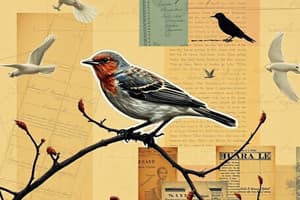Podcast
Questions and Answers
Why is Jem moody at the beginning of Chapter 7?
Why is Jem moody at the beginning of Chapter 7?
Jem remained traumatized over his experience of recovering his pants from the Radley place.
Is Scout able to understand Jem by 'climbing into Jem's skin'?
Is Scout able to understand Jem by 'climbing into Jem's skin'?
Scout is able to understand him partially, so she doesn't bother him.
What evidence does Chapter 7 provide to help the reader understand how Scout and Jem were 'parting company'?
What evidence does Chapter 7 provide to help the reader understand how Scout and Jem were 'parting company'?
Jem is more mature than Scout and begins to see Boo Radley in a different light.
Why does Jem cry at the end of Chapter 7?
Why does Jem cry at the end of Chapter 7?
Who do you think is included in Maycomb's universe of obligation?
Who do you think is included in Maycomb's universe of obligation?
What do we learn about Boo Radley's universe of obligation in this chapter?
What do we learn about Boo Radley's universe of obligation in this chapter?
Is it easy or difficult for Jem and Scout to change their apparent misconceptions about Boo?
Is it easy or difficult for Jem and Scout to change their apparent misconceptions about Boo?
What is Aunt Alexandra's vision for what is 'lady-like'?
What is Aunt Alexandra's vision for what is 'lady-like'?
Discussing the Tom Robinson case, what does Atticus mean by 'Maycomb's usual disease'?
Discussing the Tom Robinson case, what does Atticus mean by 'Maycomb's usual disease'?
How does Atticus explain his reasons for defending Tom Robinson?
How does Atticus explain his reasons for defending Tom Robinson?
What does Atticus mean when he tells Scout that 'this time we aren't fighting the Yankees, we're fighting our friends'?
What does Atticus mean when he tells Scout that 'this time we aren't fighting the Yankees, we're fighting our friends'?
What does Atticus's statement about killing a mockingbird mean?
What does Atticus's statement about killing a mockingbird mean?
What or who might the mockingbird symbolize?
What or who might the mockingbird symbolize?
How might Scout and Atticus define what it means to be a 'man'?
How might Scout and Atticus define what it means to be a 'man'?
How do Scout and Jem continue to 'part ways' in this chapter?
How do Scout and Jem continue to 'part ways' in this chapter?
Study Notes
Chapter 7-11 Study Notes: To Kill A Mockingbird
- Jem's moodiness stems from a traumatic incident involving his pants at the Radley place, impacting his emotional state.
- Scout partially understands Jem's feelings and gives him space, reflecting their complex sibling dynamics.
- Jem perceives Boo Radley as a victim of mistreatment rather than a monster, illustrating his evolving maturity compared to Scout.
- The secretive nature of Boo's actions, such as leaving gifts for Scout and Jem, highlights Jem's growing empathy and understanding of Boo's situation.
- Jem's emotional breakdown in Chapter 7 reveals his realization of the lies he believed about Boo, contrasting Boo’s reality as a misunderstood figure.
- Maycomb's universe of obligation includes men like Mr. Finch and Mr. Avery who actively help each other, while women and the Ewell family are excluded from this social duty.
- Boo Radley’s actions, like providing Scout with a blanket, contradict the children's fearful perceptions and counter the negative gossip about him.
- The journey of understanding Boo differs between Jem and Scout; Jem adjusts easily due to his maturity, whereas Scout struggles due to her youth.
- Aunt Alexandra envisions femininity according to traditional gender roles, pushing Scout toward stereotypical “lady-like” behavior, which Scout resists.
- Atticus refers to "Maycomb's usual disease," meaning racism, recognizing it as an affliction he does not share due to his wisdom and moral integrity.
- Atticus defends Tom Robinson out of a sense of duty and morality, intending to teach his children about justice, even while expecting to lose the case due to racial prejudice.
- Atticus's comment about fighting friends rather than enemies underscores his moral courage and commitment to justice despite societal backlash.
- The phrase "It's a sin to kill a mockingbird" symbolizes the idea of harming innocent beings who only contribute positively to the world.
- The mockingbird could symbolize innocence and goodness, while the mad dog may represent dangerous societal evils, with implications throughout the novel.
- The concept of manhood varies; Scout may emphasize integrity and kindness, while Atticus would likely stress moral courage; Jem likely aligns more with Atticus's views.
- Scout and Jem's growing divergence is illustrated by their contrasting reactions to Atticus's sharpshooting skills, marking their different perspectives as they mature.
Studying That Suits You
Use AI to generate personalized quizzes and flashcards to suit your learning preferences.
Description
Explore the key themes and characters in Chapters 7-11 of 'To Kill A Mockingbird' through guided reading questions. This quiz will help you delve deeper into Jem's emotional state and the events affecting the characters during this part of the novel.




